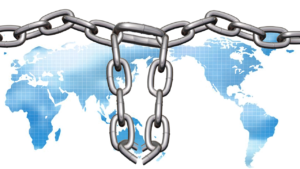Anyone who has been following international news has watched or read with dismay the rising violence in Kenya following presidential elections. The Kikuyu tribe, which has long been the dominant tribe in Kenyan politics (and is the tribe of the current embattled president) are, for the first time, on the run within Kenya [“Kenya Kikuyus, Long Dominant, Are Now Routed,” by Jeffrey Gettleman, New York Times, 7 January 2008].
“Kenya’s privileged tribe is on the run. Over the past few days, tens of thousands of Kikuyus, the tribe of Kenya’s president, have packed into heavily guarded buses to flee the western part of the country because of ethnic violence. On Sunday, endless convoys of buses — some with their windshields smashed by rocks — crawled across a landscape of scorched homes and empty farms. It is nothing short of a mass exodus. The tribe that has dominated business and politics in Kenya since independence in 1963 is now being chased off its land by machete-wielding mobs made up of members of other tribes furious about the Dec. 27 election, which Kenya’s president, Mwai Kibaki, won under dubious circumstances. In some places, Kikuyus have been hunted down with bows and arrows.”
Lest anyone downplay the seriousness of such violence, one need only remember that nearly a million people were killed by machetes, cudgels and like during the violence that occurred in Rwanda in 1994. The violence in Rwanda was also tribal, between the Tutsis and Hutus. In Kenya, the tribes involved are the Kikuyu and the Kalenjin.
“Many Kalenjin are unapologetic. Robert Tutuny, a Kalenjin farmer, stood on a hillside on Sunday with an iron bar in his hands and looked down at the charred remains of a Kikuyu village that was razed a week ago. ‘We hate these people,’ Mr. Tutuny said. The election — and the unresolved battle about who won — has ignited old tensions in Kenya, which in a week and a half has gone from being one of Africa’s most promising countries to another equatorial trouble zone.”
For decades Kenya has been a vacation destination, especially for Europeans looking for quiet seclusion on Mombasa’s warm beaches or travelers looking for an exotic photographic safari in Kenya’s national parks. Kenya has also been a valued ally for the United States. Since receiving its independence from Britain in the 1960s, Kenya appeared to have successfully become a melting pot of tribes, especially in the Nairobi, the Kenyan capital. As Gettleman writes, in Nairobi “people from different tribes live side by side and often work in the same office. They are aware of ethnic differences and sometimes joke about them, but it usually does not go further than that.” But apparently the situation is much different in rural areas.
“A tribal war is shaping up between the Kalenjin, who mostly support Kenya’s opposition leaders, and the Kikuyus, who voted heavily — up to 98 percent in some areas — for the president. Tens of thousands of Kikuyus are camped out at police stations and churches for protection, waiting for buses guarded by military escorts to evacuate them to the central highlands, the traditional Kikuyu homeland. There, amid the lush tea fields and rolling green hills, they are safe because almost everyone who lives in the highlands is Kikuyu. Ethnic conflict is now threatening the decades of stability that has set Kenya apart from so many of its neighbors, like Congo, Rwanda, Somalia and Sudan. But Kenya has struggled with ethnic violence before. Its rare bursts usually come around election time. … The last time the Rift Valley was this violent was in 1992, another election year in Kenya and a time of turbulent transition between dictatorship and democracy. Kalenjin militias, stirred up by politicians who told them that the valley was Kalenjin ancestral land, massacred hundreds of Kikuyus in a bid to steal their farms. Since then, Mr. Kiai said, ‘Emotions have been festering, resentments have been building and we sat around pretending ethnicity didn’t exist.’ Kenya has more than 40 tribes, but the Kikuyus have almost always been on top. They run shops, restaurants, banks and factories across the country. One reason Mr. Kibaki has engendered so much resentment from other tribes is because many of the top officials in his government — including the ministers of defense, justice, finance and internal security — are Kikuyus. The Kikuyus are the biggest tribe in Kenya but far from a majority, at 22 percent of the population. The Kalenjins make up about 12 percent.”
The latest violence is a direct result of the presidential campaign and election.
“Raila Odinga, the top opposition candidate and a member of the Luo tribe, built his campaign on a promise to end Kikuyu favoritism and share the fruits of Kenya’s growing economy with all tribes. Early election results had him way ahead and his party winning the most seats in Parliament. But at the 11th hour of the vote-tallying process last Sunday, Mr. Kibaki surged. Election observers have said the president’s party rigged the results to stay in power. Millions of opposition supporters across Kenya were outraged. Not only did their candidate lose, but it also seemed to them that their system, which until the election had been celebrated as one of the most vibrant democracies in Africa, had cheated them. In western Kenya, where Kikuyus are vastly outnumbered, they became easy targets. In Kisumu, the third-largest city in the country, Luos went on a rampage, burning down Kikuyu shops and ransacking the downtown.”
Amid this growing unrest, Washington Post columnist David Ignatius openly wonders what role the U.S. military would have played had the new African Command been in place [“Into Africa Without a Map,” 6 January 2008].
“[The]tribal violence in Kenya reminds us of the severe social and political problems facing Africa. But is greater involvement by the U.S. military the answer to these African challenges? The growing U.S. military role in Africa isn’t a hypothetical issue. In one of the sleeper events of 2007, the Pentagon established a new command for the continent, known as AFRICOM. The organization has a commander, Gen. William “Kip” Ward, but it doesn’t yet have a plan for where it will be based or even a clear statement of its role. Right now, it’s a headquarters in search of a mission. Pentagon officials have offered idealistic but vague explanations of what the new command is supposed to do. ‘We want to prevent problems from becoming crises, and crises from becoming catastrophes,’ said Theresa Whelan, deputy assistant defense secretary for African affairs. Ward said in an interview two months ago with PBS’s Charlie Rosee, ‘We have in our national interest that Africa is a stable continent. That’s what’s in it for us.’ Nobody would argue the need for assisting Africa, especially after the gruesome ethnic killings that left more than 300 Kenyans dead. But how should that assistance be provided? Is the U.S. military the right instrument for the nation-building effort that AFRICOM apparently envisions? Should American soldiers coordinate the digging of wells, the vaccination of animals and other development projects that will come under AFRICOM’s umbrella? Will a larger U.S. military presence check terrorism and instability on the continent, or will it instead become a new magnet for anti-Americanism? The chaos in Kenya should prompt a serious discussion, better late than never, of these issues.”
My colleague Tom Barnett would probably argue that the military isn’t the right force for national building; but since his System Administration Force hasn’t been established yet, the military remains the only organization with sufficient size, reach, organization, and resources to take on the task. For more about what a System Administration Force might look like and accomplish, see my most recent posts on the subject Soft Power, SysAdmin, and Development-in-a-Box™ and The Economist Looks at the System Administration. Ignatius admits that the military is logical default organization, but without a clearer roadmap to guide its operations in Africa, he worries that expectations will be high and results will disappoint. Not a good formula for reviving America’s image abroad.
“The new command has had bipartisan political backing — who could question the idea of taking Africa more seriously? But behind the scenes, some senior Pentagon officials have been skeptical. ‘The depth of support is pretty shallow, frankly, and that’s a real hazard. There’s a danger that everything will be done on the cheap,’ says Stephen Morrison, director of the Africa Program at the Center for Strategic and International Studies. The real puzzle with AFRICOM is understanding its purpose. Some advocates propose pragmatic strategic goals, from containing China’s influence in Africa to countering terrorism to protecting African oil supplies. But the official rationale is much less specific — in Ward’s formulation, ‘bringing stability to the continent.’ Some Africans worry that these generalities mask a deeper goal of establishing what amounts to American neocolonialism. What would AFRICOM be doing now in Kenya, say, if it were up and running? Would it intervene to halt the violence between Kikuyus and Luos that exploded last week? Would it work with nongovernmental and relief organizations? Would it operate jointly with the Kenyan military to restore order? Ward says that he does not ‘envision kinetic operations for United States forces,’ but what happens if Kenya spirals toward Rwanda-level genocide? The U.S. military is so powerful — so blessed with money and logistical skill and leadership — that it’s easy to make it the default answer to problems that are otherwise in the ‘too hard’ category. That’s my worry about AFRICOM. Its nation-building goal sounds noble, but so did European imperialism of 150 years ago to its proponents. Before America sends its soldiers marching off to save Africa, we need more discussion about what this mission is all about.”
In my numerous discussions about Development-in-a-Box™, I’ve always made it a point to note that development begins with security. That is fundamental assumption behind the establishment of AFRICOM. Continuing to ignore Africa is in nobody’s best interests, but Ignatius’ point is well made. We need to make sure that AFRICOM’s objectives and methods are understood — both in the U.S. and in Africa. Otherwise, the high (or low) expectations for the command might generate more disappointment than development.




